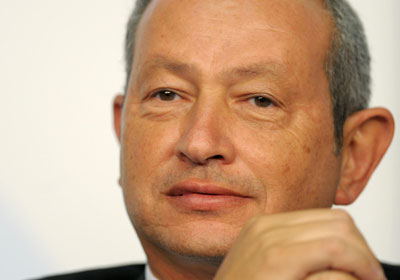
(AFP Photo)
By Naguib Sawiris
Many people, including traders, believe that the stock market is a place for venture and quick profit, not knowing that its real goal is to present investments for investment funds and individuals, both locally and globally in companies’ capitalthrough this mechanism that allows investments by buying and selling shares on desiring to exit easily and safely. This allows companies to increase their capital and thus increase their activities, creating more jobs and eventually increasing tax outcome and improving the state’s resources. A limited vision of this activity and undermining it is definitely against the state’s public interest.
The finance minister imposed a trading tax on exchange, hitting it before it recovered from the revolutions, terrorism and the exiting of major companies and entities in all sectors of banking, communications, and cement, in addition to the absence of incentives in the Egyptian exchange as well as the dollar shortage that led to a delay in conversions for foreign investors, leading to their exiting and refraining from investing in the Egyptian exchange. This is assuming that investors do not have other options and are stuck with investing in the Egyptian exchange, the only one in the region that imposes the trading tax.
The tragedy doesn’t end there; traders have to use an expert to help unravel the mystification of this tax and its calculations.
The result was that all investment funds sold their shares and permanently exited the exchange, causing its collapse.
Between late conversions and a vague tax law, investors realised there are more places to head to after Saudi Arabia opened its exchange to foreign investors instead of limiting it to only Saudi Arabians.
I do not believe the Minister of Finance conducted a study on the volume of taxes that will be allocated. I also heard that the numbers will reach tens of billions, but I doubt this is true, because the huge losses and the exit of many companies makes it impossible for this number to be true. This is besides the companies that will revoke their listing in the EGX, as well as the foreign companies that will exit without coming back. Consequently, the rate of transactions will drop. So, the first question is directed to the minister of investment: Am I wrong about this? And if this is correct, did he have a talk with the Minister of Finance and explain this? If the two did talk and did not agree on anything, the Prime Minister must resolve this issue.
The EGX lost tens of billions of pounds as a result of the vague situation of the capital revenue of taxes, while the minister of finance announced that his ministry is studying amending the tax treatment for foreign investors with regards to this tax so that there would be equal treatment with local investors. On the other hand, chairman of the Egyptian Financial Supervisory Authority (EFSA) made a clearer and braver statement, in which he said that “the market needs clear and definitive decisions with regards to the tax, whether through amending the law using a presidential decree or amending the executive regulations. This is within the power of the Ministry of Finance, so we need a definitive answer because it took so long and the market needs this answer from the government”.
On my part, I demand that the prime minister meet with all the competent authorities related to EGX, EFSA, and the ministers to resolve the issue before it is too late for EGX to recover. If this has already taken place and they did not reach an agreement, I have a great and simple idea which might not sound very serious: the prime minister should replace the minister of finance with the minister of investment, and vice versa.


